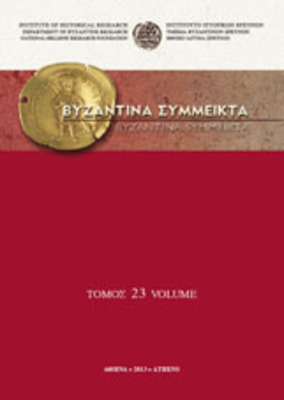Η «επιβουλή» του Ρωμανού Βοΐλα. Μία μορφή πρόληψης συνωμοσίας στα μέσα του 11ου αιώνα
Part of : Βυζαντινά Σύμμεικτα ; Vol.14, No.2001, pages 49-56
Issue:
Pages:
49-56
Section Title:
ιστορική έρευνα
Author:
Abstract:
Stauroula HondridouThe plot of Romanus Boïlas: A Type of Concpiracy Prevention in the Mid-Eleventh Century Conspiracy was not rare during the long-lived history of Byzantium. Accordingly, the plot of Romanus Boïlas against Constantine IX Monomachos, in the middle of the 11th century, would not have been of great interest, if the way by which the Byzantine emperor handled it did not render it an event worth to investigate.According to the sources, Romanus Boïlas served Monomachos' bodyguard battalions, when he acquainted the emperor. Soon, he rose in the state hierarchy and became politically powerful, a fact that enabled him to conspire against the throne. His plot was revealed before his attempting to assassinate the emperor and was himself arrested. However, during the trial Monomachos tried to acquit Boïlas by claiming the offender's naiveté and honesty. After the deliberations, Monomachos honoured Boïlas with a symposium, while Boïlas abettors were arrested, tortured, deprived of their property and exiled.Byzantine historiographers interpret Monomacho's peculiar reaction as the result of his dependency on Boïlas, whom they consider as the emperor's buffoon, although the Emperor was in his hands a weak-willed tool.Nevertheless, the thorough examination of the sources, the investigation of the two heroes' profiles according to the point of view represented by Byzantine historiographers, and the detailed study of the political events at the time of the conspiracy, lead us to a different conclusion. Thus, Boïlas' plot is not to be seen as a hostile action targeting the central, imperial power, but rather as a means by which the imperial power attempted to control a conspiracy against itself.
Subject:
Subject (LC):
Keywords:
Κωνσταντίνος Θ΄ Μονομάχος, Ρωμανός Βοΐλας, συνωμοσία, Κωνσταντινούπολη, 11ος αι., Μέση βυζαντινή περίοδος, 11ος αι., φιλολογικά πηγές
Notes:
Αιώνας: 11ος, 1042-1055
Electronic Resources:




